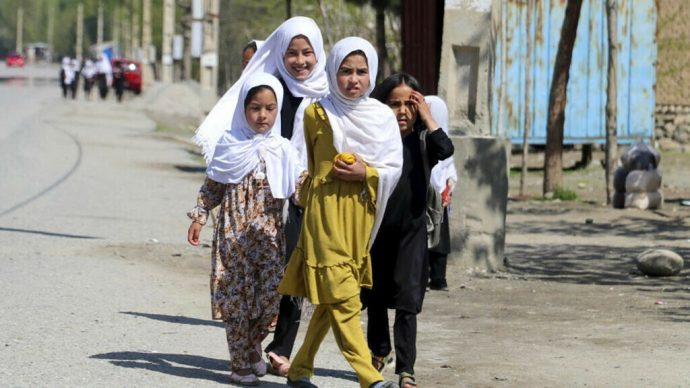
When Afghan schools resume, girls will not be allowed for a third year.
Afghanistan’s schools reopened on Wednesday, amid protests from girls who were disappointed that they would not be allowed to enrol in secondary education for a third year running.
Following their return to power in 2021, the Taliban government forbade girls from attending secondary schools in March 2022, enforcing a strict interpretation of Islam that the UN refers to as “gender apartheid”.
At the ceremonial opening of the school year on Wednesday morning, local officials gathered at the entrance of Kabul’s Amani school, where uniformed boys waving black and white Taliban flags stood.
But when the school bell rang, Zuhal Shirzad, an 18-year-old inhabitant of Kabul, was forced to stay at home.
“Every year when my brother went to school, I felt very disappointed,” she stated to AFP.
Asma Alkozai, an 18-year-old from the western city of Herat, stated, “It is painful that boys can continue our education and studies, and none of the girls like me can.”
“When there are barriers to education in society, such societies can never progress,” she stated to AFP.
Restrictions have led to the emergence of online classes; however, students and teachers argue that these are a poor replacement for in-person instruction due to the scarcity of computers and internet, as well as the isolation of studying through a screen. “Fifty percent of society”
Tuesday, one day ahead of the start of the Afghan calendar new year, the education ministry announced the new school year in a media invitation that specifically prohibited female journalists from covering the ceremony at the Amani school.
The new academic year at government universities began recently as well, but since December 2022, women have not been allowed to enrol there.
Women have been shut out of many areas of public life under the Taliban regime. Women are no longer permitted to enter parks, amusement fairs, or gyms, and beauty parlours have closed.
The Taliban regime has not yet received worldwide recognition; women’s rights continue to be a major barrier to this acceptance.
Since girls are not allowed to attend secondary schools, Taliban officials have maintained that they are developing a system that conforms to their view of Islamic law.
Faiz Ahmad Nohmani, who enrolled in a private school in Herat on Wednesday, said he was “very sorry” that girls were not returning, but he was delighted to start the new school year.
“Today, when I came to school, I wanted our sisters to come as well because they are half of society,” the teenager told AFP. “They should study like us.”
18-year-old Ali Ahmad Mohammadi, who is enrolled in his last year of secondary school in Herat, said he is conscious of his opportunity to learn.
The teenage girl, who intends to attend college, stated, “Literacy helps us progress, it saves society.” “An illiterate society will always face stagnation.”

Content writer, educationist, teacher, researcher, social media manager, and a SEO manager from lahore. She has been working as a freelance academic and non-academic writer for more than 20 years now. She has a passion to learn new things and has a knack for writing and she combines both things to produce write ups she pours her heart out in.

